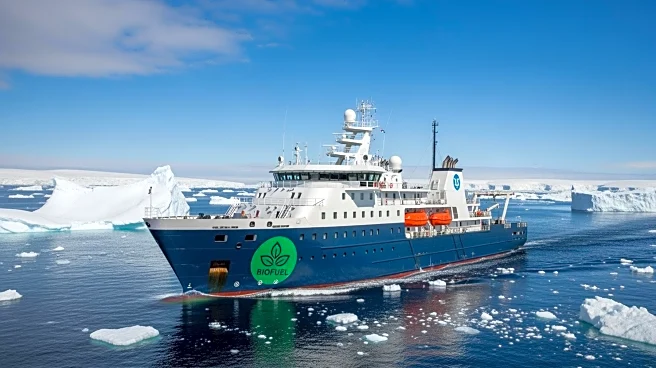What's Happening?
The British Antarctic Survey (BAS) has embarked on a significant initiative to decarbonize its marine operations by deploying its flagship polar research vessel, the RRS Sir David Attenborough, to Antarctica
using hydrotreated vegetable oil (HVO) as fuel. This advanced research vessel departed from Plymouth for the 2025/26 Antarctic field season, which involves a 6,000 nautical-mile journey to Montevideo, Uruguay, and onward to Antarctica. The use of HVO, a renewable diesel produced through hydroprocessing of oils and fats, is expected to reduce carbon emissions by up to 94% compared to conventional diesel fuel. BAS aims to achieve net zero emissions by 2040, with shipping activities currently accounting for approximately 60% of its carbon footprint. The vessel will support over 60 science projects across five BAS-operated stations, focusing on climate, ocean, glaciological, and ecological research.
Why It's Important?
This initiative by BAS is crucial in the global effort to combat climate change, particularly in the sensitive Antarctic region. By reducing emissions from one of the most advanced research vessels, BAS is setting a precedent for sustainable practices in scientific exploration. The research conducted during this expedition will provide valuable insights into the Southern Ocean's role in carbon cycling and climate regulation, which is vital for understanding global climate dynamics. The findings could influence policy decisions and contribute to more resilient communities worldwide, emphasizing the importance of sustainable scientific practices.
What's Next?
The research vessel will continue its journey to Antarctica, where scientists will conduct extensive research over the next seven months. The focus will be on understanding the interactions between ocean heat and nutrients, glacier calving, and carbon exchange between the Southern Ocean and the atmosphere. The team will also track krill populations, which are essential for regional biodiversity and carbon absorption. The outcomes of these studies are expected to inform future environmental policies and strategies for mitigating climate change impacts.
Beyond the Headlines
The use of HVO in marine operations highlights the potential for renewable fuels to transform industries traditionally reliant on fossil fuels. This shift not only reduces emissions but also encourages the development of sustainable fuel sources, which could have long-term benefits for global energy markets. Additionally, the research conducted in Antarctica will contribute to the broader understanding of climate tipping points and extreme weather patterns, reinforcing the need for continued investment in scientific research to address environmental challenges.










